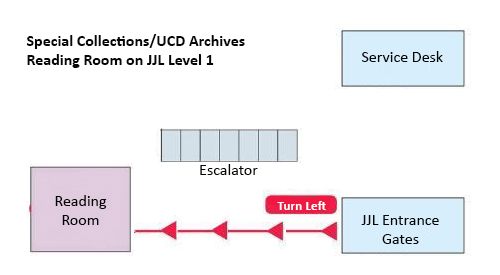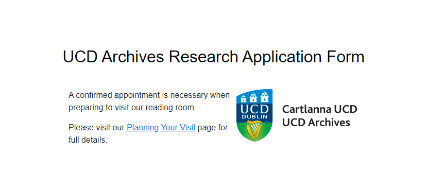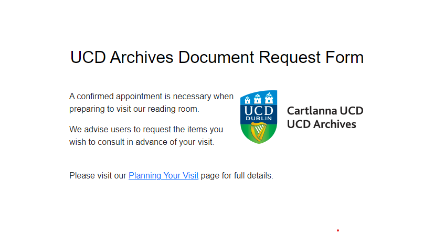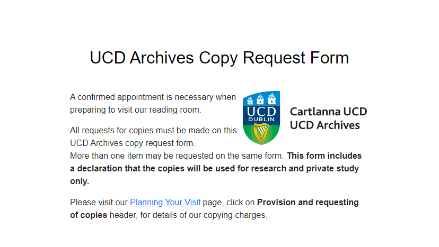UCD Archives is on the main UCD campus at Belfield, Dublin 4. A confirmed appointment is necessary.
The UCD Archives Reading Room is located in a shared reading room with Special Collections on Level 1 in the James Joyce Library.
UCD can be reached by car or by public transport. Information on travelling to the campus is available on the university website.
Due to the heavy demand on parking facilities on the Belfield campus, visitors are strongly recommended to use public transport. Visitors travelling by car may be asked by university security personnel to state the purpose of their visit before being given access to parking facilities. Pay and display parking facilities are available but are often full. Information on parking in UCD is available on the university website.
In preparation for your visit our descriptive catalogues are available for you to consult online. When on a specific collection's web page, click on the 'Conditions of Access and Use' tab and there you will find the 'Descriptive Catalogue'. Click on it and a searchable PDF will open in a new window. If not highlighted, please let us know.
- UCDA Reading Room Access & Location
- Opening Hours
- What do I need for admission?
- How do I make an appointment?
- Reading Room Rules & Procedures
- Reading Room Forms
- What information is available on collections?
- What restrictions affect access to collections?
- Requesting and handling documents
- What can I take into the Reading Room?
- Copyright and Data Protection
- Provision and requesting of copies
Our reading room service is located in a shared Special Collections/UCD Archives reading room on Level 1 in the James Joyce Library.
Access is by appointment only.

Our reading room service operates in a shared reading room with Special Collections on Level 1 of the James Joyce Library. Access is by appointment only.
The UCDA reading room service will close for the Christmas holiday period at 4.30pm on 18 December 2025 and will re-open at 10.00am on Monday 5 January.
Our opening hours for December 2025 are:
Monday–Thursday, 1–4 December
10:00–13:00
14:00–16:30
Monday, Wednesday–Thursday, 8, 10–11 December
10:00–13:00
14:00–16:30
Monday, Wednesday–Thursday, 15, 17–18 December
10:00–13:00
14:00–16:30
Our opening hours for January and February 2026:
Monday, Wednesday–Thursday, 5, 7–8 January
10:00–13:00
14:00–16:30
Monday, Wednesday–Thursday, 12, 14–15 January
10:00–13:00
14:00–16:30
Monday, Wednesday–Thursday, 19, 21–22 January
10:00–13:00
14:00–16:30
Monday, Wednesday–Thursday, 26, 28–29 January
10:00–13:00
14:00–16:30
Wednesday–Thursday, 4–5 February
10:00–13:00
14:00–16:30
University Closures 2026
Monday, 2 February
Tuesday, 17 March
Friday, 3 March
Monday, 6 April
Monday, 4 May
Monday, 1 June
Monday, 3 August
Monday, 26 October
All readers must be registered, have a current reader's card, and must make an appointment to consult material in our reading room.
All registered readers with an appointment, will be issued with a temporary UCD Library card which will allow them entry and exit to the James Joyce Library.
You may register using this form. Registration is valid for one calendar year and must be renewed annually.
In order to complete the online registration form, you must read and agree to abide by our reading room rules and procedures outlined in our Planning Your Visit page.
Please email UCD Archives to make an appointment: archives@ucd.ie
General Rules
1. Readers should note that the conditions under which certain collections are deposited require application to the owners or trustees of these collections before access can be granted. Readers are strongly recommended to contact UCD Archives in advance to avoid delays caused by such application.
2. An appointment is essential. All readers must complete a simple online registration procedure before being given access to the reading room. This includes a declaration that the researcher’s conduct will conform with our reading room rules and procedures (see below), and that the reader understands their obligations under the GDPR and the Data Protection Act 2018. Researchers will be issued with their reader’s card on their initial visit to our reading room.
3. Outdoor coats, umbrellas, hats, folders, envelopes, cases or bags, including carrying cases for laptop computers must be left in the lockers provided. Mobile phones must be muted.
4. Readers must not bring into the reading room anything liable to cause damage to archives. This includes food and drink; sweets or chewing gum; newspapers; sharp instruments; erasers; and correcting fluid.
5. Smoking is prohibited.
______________________________
Reading Room Rules
1. When handling original archives, readers must be aware that these are unique, fragile and must be treated with respect.
* Ensure that your hands are clean.
* Do not lick or moisten you fingers before turning pages.
* Do not lean on or place anything on archives. Do not rest your device, notebook, paper or cards on archives while taking notes.
* Do not mark, crease or fold archives.
* Do not disorder or rearrange loose documents or remove tags or fasteners from files.
* Do not place clothing on the reading tables.
* Book supports must be used when directed by the duty archivist.
2. Pencils only may be used in the reading room. No pen of any kind may be used for any purpose. No pen should be produced or left on a table. Pencils are supplied in the reading room.
3. Laptop computers and tablets may be used in the reading room. There is a power supply to each desk.
4. Personal photography is allowed in the reading room, under certain conditions. Please discuss with the duty archivist. Digital copies of documents may be supplied by UCD Archives. The duty archivist will explain the procedures and charges involved. All copying whether carried out in the reading room or supplied by UCD Archives, is carried out on the understanding that readers agree to abide by their obligations under copyright legislation.
5. A Copy Request Form must be completed whether taking photographs or requesting digital copies.
5. Readers are responsible for the archives issued to them. Archives must not be handed by one reader to another.
______________________________
Production of Archives for Consultation
1. Documents must be requested using our Document Request Form. We advise readers to request documents as far in advance of their visit as possible.
2. The majority of collections are routinely produced in surrogate form (microfilm or digital scans) as a major component of UCD Archives’ preservation management strategy.
3. Original material will be produced Monday to Thursday. Requests to view original material must be made at least one week in advance of your visit.
4. A reader will not be issued with more original documents at any one time than is considered appropriate by the duty archivist.
5. Readers may indicate that they wish archives to be held out for further consultation. Archives in original format will be returned to storage at the close of every Thursday, and will have to be requested again.
Where permission to consult archives is granted, it is subject to compliance with these rules.
Any infringement may result in permission being withdrawn.
It is the policy of UCD to prosecute anyone damaging or stealing archives.
There are a number of forms our users need to be aware of to work in our reading room, request documents, and request copies of documents.
To work in our reading room, you must complete a Research Application Form which entitles you to a reader's card.
 |
|---|
To consult documents in our reading room, you must complete a Document Request Form, which enables the duty archivist to prepare the material you wish to consult in advance of your visit.
 |
|---|
To use a camera in our reading room, you must complete a Copy Request Form, giving the complete reference for each item you have photographed. There is no charge.
 |
|---|
To request digital copies of documents from our collections, you must complete a Copy Request Form, giving the complete reference for each item you want copied. Requests for digital copies must be accompanied by payment . Details of our copying charges can be found under Provision and Requesting of Copies on our Planning Your Visit page.
The Collections pages provide access to information on the three categories of collections in UCD Archives: Deposited Collections; University Archives; and Franciscan manuscripts.
The Deposited Collections and University Archives pages give general descriptions of the content of individual collections as well as specific detail on collection reference codes, size and covering dates of collections; and information on access including restrictions on access to individual collections. Finding-aids may be consulted online.
The Franciscan MSS pages give a synopsis of the development of the collection; the basis of its transfer to UCD Archives; and some sample images. The digitisation of the manuscripts began in Autumn 2003 in conjunction with the ISOS project. Images from a large number of the manuscripts are available on the ISOS website and UCD Digital Library.
Collections are made available for research only when they have been fully processed and an appropriate finding aid, usually a descriptive catalogue, constructed.
Both Deposited Collections and University Archives are subject to a thirty year rule.
Deposited Collections may be subject to additional restrictions or access requirements. In particular, application to the owners or trustees of certain collections is necessary before access can be granted.
Access to collections or parts of collections may be withdrawn from time to time as material is removed for conservation or preservation reformatting.
Further information on access to individual collections can be found in the Deposited Collections section of this website. Click on the link for an individual collection and scroll to the end for specific information on access to that collection. The absence of a named collection from the website may be taken as a reliable indication that it is not available for research, usually because it has not been processed.
As part of UCD Archives' collection management strategy, material is routinely reformatted and made available for consultation in surrogate form, on microfilm or in digital format. The access section at the end of each collection description on the Deposited Collections pages indicates whether that collection is produced in surrogate form.
Where a surrogate is not available, originals will be produced depending on their condition.
We ask users to request the items they wish to consult as far in advance of your visit as possible, but at least two days. All items must be requested using the Document Request Form.
Requests for original material must be received at least one week in advance of their production. Original material will be produced Monday to Thursday.
The handling of original documents is subject to the specific guidelines outlined in our reading room rules and procedures, listed on our Planning Your Visit page.
Pencils, notepaper, laptop computers, tablets and digital cameras (including mobile phone cameras) are allowed in the reading room. The use of pens of any kind is prohibited. Further information is available under Reading Room Rules and Procedures in our Planning Your Visit page. Lockers are provided for the deposit of cases and bags.
Pencils are supplied if required. Please bring your own notepaper.
Copyright
Archives are copyright and are subject to the restrictions on reproduction and publication included in the Copyright and Related Rights Act, 2000.
A single copy of a document may be provided under Section 67 of the Act provided that a researcher requesting a copy of a document completes a declaration that the copy is for the purposes of research or private study only and that it will not be used for any other purpose. The declaration is a requirement under Statutory Instrument 427 of 2000.
University College Dublin does not, in many instances, own or administer the copyright in collections deposited in UCD Archives; and cannot therefore give permission for quotation from or publication of documents from those collections. It is the researcher's responsibility to secure the permission of the copyright owner and comply with copyright law in all other respects.
UCD Archives may be able to offer guidance on the ownership of copyright in certain collections.
Data Protection
Researchers have a responsibility under the Data Protection legislation (GDPR and the Data Protection Act 2018) to ensure that the personal data contained in any archives to which they are being granted access, is used solely for the purpose of historical research. It is not permitted to process personal data for any other purpose, especially any purpose which could affect the rights and freedoms of individuals’ (data subjects) whose personal data are contained in the Archives and which could cause damage or distress to the data subjects.
The GDPR and the Data Protection Act 2018 require that the results of a researcher's work, or any resulting statistics published or used, are not made available in a form that directly or indirectly allows identification of any living individual featured in the data. The personal data to which researchers gain access will not be disclosed to any other person.
Researchers undertake to keep the personal data secure and to protect it from unauthorised disclosure to any party, any copies of material, or any notes taken during their research in UCD Archives, which contain personal data. Researchers undertake to keep the personal data only for as long as necessary under the terms of their research and to securely delete or shred the material once this period has elapsed.
More information on how to process personal data in line with data protection requirements can be found online at www.ucd.ie/gdpr/.
Provision of Copies
The terms under which certain collections are deposited prohibit the provision to researchers of copies of any documents in those collections. Where no such prohibition exists, UCD Archives can provide low resolution PDFs and high resolution digital images of items in our collections.
PDF copies and other digital images will be provided if a digital surrogate exists or if the item is in good condition, suitable for digitisation, and is no larger than A3 in size.
Copying charges
Low resolution PDF: €1 per image
400dpi Jpeg or Tiff: €10 per image
Requesting copies as required by Statutory Instrument 427 of 2000, made pursuant to the Copyright and Related Rights Act 2000 charges include a contribution to the general expenses of UCD Archives. Please note that payment can be only be accepted online: www.ucd.ie/archives/payments.
All requests for copies and photographs must be made using our Copy Request Form. More than one item may be requested. The form includes a declaration that the copies will be used for research and private study only.
All copy request forms must indicate the number of pages to be copied. All requests for copies must be accompanied by payment. It will not be possible to process any requests for copies until payment has been received.
Requests for copies must include specific page references or descriptions unless a request is being made for a copy of a complete item in which case the collection code and item number will be sufficient. Failure to identify items exactly may result in delay or the material not being copied.
Commercial copies
Requests for digital copies of photographs and documents for use in exhibitions, publications (online and in print) and documentaries are also subject to copyright and data protection legislation and require additional documentation. All such requests should be made to the Principal Archivist well in advance of any deadlines (we recommend that a minimum of six weeks' lead-time be given to any digital imaging request).
